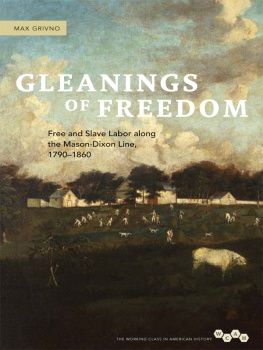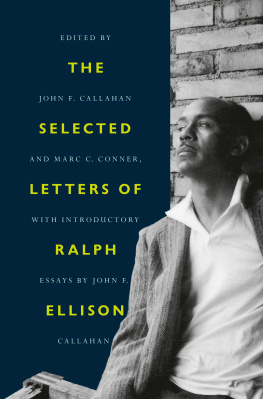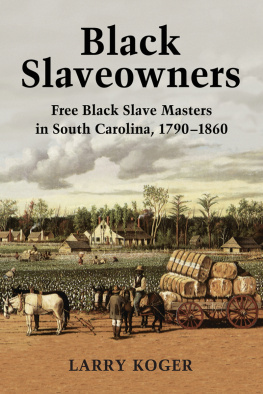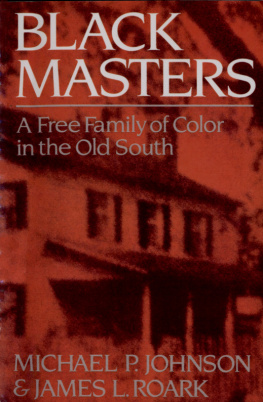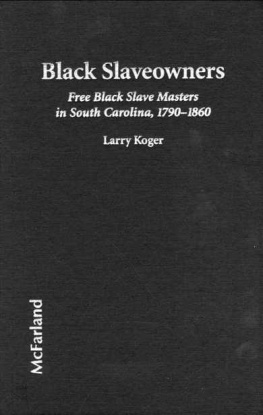1984 The University of North Carolina Press All rights reserved
Manufactured in the United States of America
Library of Congress Cataloging in Publication Data Main entry under title:
No chariot let down.
Bibliography: p.
Includes index.
1. Afro-AmericansSouth CarolinaCharlestonHistory 19th century. 2. Charleston (S.C.)Race relations. 3. Ellison family. 4. Johnson, James Marsh. 5. Afro-AmericansSouth CarolinaCharlestonCorrespondence. 6. Charleston (S.C.)History1775-1865. I. Johnson, Michael P., 1941- . II. Roark, James L.
F279.C49N46 1984 975.791500496073 83-25897
ISBN 0-8078-1596-9
THIS BOOK WAS DIGITALLY MANUFACTURED.
ENDPAPERS
Charleston in 1850
Lithograph by John William Hill in the South Carolina Historical Society.
Photograph by Harold H. Norveil.
To our teachers,
Carl N. Degler
and
the late David M. Potter
Acknowledgments
Scholarship is a collaborative enterprise, and it is our pleasure to acknowledge that fact by recording our indebtedness to the men and women who have helped us prepare this volume. Archivists and librarians have made an immeasurable contribution. We have been the beneficiaries of the staffs of the South Carolina Department of Archives and History, especially Marion Chandler and Joel Shirley; the South Carolina Historical Society, especially Gene Waddell and David Moltke-Hansen; Special Collections, Robert Scott Small Library, College of Charleston, especially Ralph Melnick; the Southern Historical Collection, University of North Carolina, Chapel Hill; the Charleston Library Society; the Baker Library, Harvard University; the Yale University Library; the Library of Congress; the Friends Historical Library of Swarthmore College; the New York Public Library; the Pennsylvania Historical Society; the Public Archives of Canada; and the Archives of the Church of Jesus Christ of Latter-day Saints. We are particularly grateful for the invaluable assistance of E. L. Inabinett and Allen Stokes of the South Caroliniana Library, University of South Carolina, Columbia. Only those who have worked in this outstanding research library can fully appreciate Allen Stokess extraordinary knowledge of its holdings, his ability and willingness to point scholars to promising collections, and his patience with those who continue to pester him long after they have left Columbia.
Several persons have graciously welcomed us into their homes and generously shared with us their knowledge of Stateburg and its people. Captain Richard and Mrs. Mary Anderson of Borough House provided us with several items from their family archives, and allowed us to spend a memorable day roaming over the former Ellison property, where the Ellison home and family cemetery can still be found. Mrs. Gery Leffelman Ballou and her mother Mrs. Pauline Leffelman recounted the discovery of the Ellison letters and life in the former Ellison house during the 1930s. Mrs. Julia Simons Talbert and Mrs. Emma Fraser told us of their memories of members of the Ellison family.
Many people provided assistance at various stages of the project. For practical arrangements, we want to thank John G. Sproat and Bill and Hilma Wire. We are grateful to Rector Benjamin Bosworth Smith and Barney Snowden of Grace Episcopal Church, Charleston, for photographs and access to church records. Joe Reidy of the Freedmen and Southern Society Project shared with us his expert knowledge of the records of the Freedmens Bureau, Washington, D.C. We also want to thank Charles Aiken, Lewis Bateman, Ira Berlin, Susan Bowler, Debra Busbie, David Carlton, Peter Colcanis, Jerry Cooper, Richard Cot, Carl Degler, Lee Drago, Gwen Duffey, Lacy Ford, George Fredrickson, Robert Harris, William Hine, Esmond Howell, Charles Korr, Cynthia Miller, Gary Mills, David Rankin, George Rawick, Loren Schweninger, Arthur Shaffer, Nan Woodruff, and C. Vann Woodward.
Our biggest disappointment was our failure to locate a single portrait or photograph of the Ellisons, the Johnsons, or any other of Charlestons free mulatto aristocrats. Their likenesses survive only in the letters themselves. For glimpses of the antebellum setting of places, objects, and white persons that figure prominently in the letters, we are indebted to Harold H. Norvell, Charles Gay, George Terry, and Chris Kolbe for photographs and to Karin Christensen for preparing the map.
Finally, we are grateful for the financial support of a Humanities Faculty Fellowship from the University of California, Irvine, and a grant from the Weldon Spring Endowment of the University of Missouri.
Introduction
In the summer of 1935, three little girls were playing under their house in Stateburg, South Carolina, escaping the hot sun and watching doodlebugs capture and eat ants. In the half-light Gery, Mary, and Francine Leffelman happened to notice a cardboard box toward the front of the house. When they crawled forward to investigate, they found that the box contained some letters underneath what the girls father later identified as a saw from a cotton gin. The twins, Gery and Mary, had just learned to read and recognized that the letters were old. They took them to their father, Lewis John Leffelman, a forester educated at the University of Minnesota and Yale who had recently come to Stateburg to manage a large timber plantation. John Leffelman had always been interested in history, and he preserved the letters his daughters had discovered. More than forty years later, in the spring of 1979, the South Caroliniana Library at the University of South Carolina acquired the letters from Mrs. Gery Leffelman Ballou. To bring those letters fully to light and to make them available to any interested reader, they are published here for the first time.


